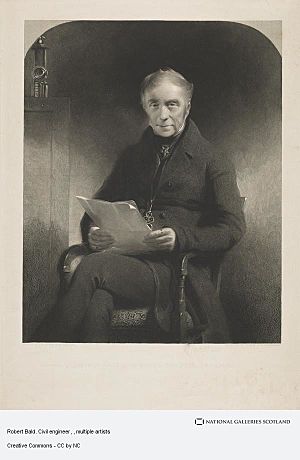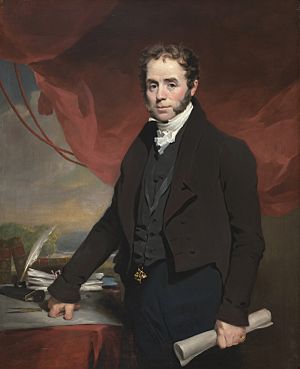Robert Bald facts for kids
Quick facts for kids
Robert Bald
|
|
|---|---|

Robert Bald, painted by Sir John Watson Gordon
|
|
| Born | 1776 |
| Died | 1861 |
| Nationality | Scottish |
| Occupation | Engineer |
| Parent(s) | Alexander Bald |
| Engineering career | |
| Discipline | Civil Mining |
| Institutions | Royal Society of Edinburgh Society of Antiquaries of Scotland Geological Society of London Institution of Civil Engineers Highland and Agricultural Society of Scotland Wernerian Natural History Society Royal Caledonian Horticultural Society Royal Scottish Society of Arts Association for the Promotion of Fine Arts in Scotland Society of Scottish Land Surveyors |
| Projects | Göta Canal Geological Map for Scotland A General View of the Coal Trade in Scotland (1808) |
Robert Bald (1776–1861) was an important Scottish surveyor, civil engineer, and mining expert. He was known as "the father of mining engineering in Scotland" because he was one of the first and best in his field.
Contents
Early Life
Robert Bald was born in Culross, Scotland, in 1776. His father, Alexander Bald, was a manager at coal mines in Alloa. Robert's brother, also named Alexander Bald, became a poet.
Robert Bald's Work
An Amazing Engineer
Robert learned a lot about mining from his father, Alexander, who managed the Mar collieries (coal mines). They were both very skilled at inspecting mines. Robert understood how mines worked and also loved science. He wrote for important science magazines like the Edinburgh Philosophical Journal.
Around 1800, Robert started giving advice about mines. By 1805, many people in Scottish coalfields wanted his help. Even judges asked for his advice when there were disagreements.
In 1808, Robert traveled with another famous engineer, Thomas Telford, to survey the Göta Canal in central Sweden. He went back to Sweden in 1826 to check out coal fields there.
Between 1808 and 1825, Robert wrote many reports. These reports described where minerals were, how mines worked, and how to keep them dry. One of his first books was A General View of the Coal Trade in Scotland (1808). This book is still seen as an excellent description of coal mining during the Industrial Revolution. In 1812, he added a section to the book called "An Inquiry into the Conditions of Women who carry Coals under Ground in Scotland." In this part, he spoke out against women having to carry coal underground, calling it a form of slavery.
In 1812, Robert was asked to write about mines for an encyclopedia. For this, he visited a coal mine where George Stephenson had invented a steam-powered machine to lift coal. Later, in 1825, Robert and Stephenson made plans to improve the Alloa dock, including a new wet dock and a swivel bridge.
Robert was friends with George Stephenson and botanists like Patrick Neill. In 1817, he became a member of the Royal Society of Edinburgh. Around 1820, he started working as a mining engineer in Edinburgh with John Geddes. Robert Bald and John Buddle were among the first to warn people about how dangerous and flammable coal dust could be. Robert wrote about this danger in a paper in 1828. Robert was also a cousin of William Bald, a civil engineer and mapmaker.
Robert had many interests. He was part of many learned societies and wrote about different topics. These included mining engineering, palaeontology (studying fossils), archaeology (studying old things), steam engines for ships, and metallurgy (working with metals).
A Reformer
For much of his life, Robert Bald worked for the Earl of Mar, managing coal mines in Alloa. He used his position to try and make life better for miners and their families. He worked with the Earl to stop women and girls from working underground. He said, "In 1822 I tried to stop the employment of women and children as coal bearers, but the women had no other work so there was a great deal of hardship."
Together, they started Friendly Societies. These groups helped miners save money and gave small pensions to retired miners. They also set up a court system where miners could solve problems among themselves.
After his father died in 1823, Robert Bald and Robert Jameson took over running the mines. Robert Bald was able to make even more changes. He built more houses for miners and paid to clean up the streets. He gave talks about "Order and Cleanliness" and gave miners rules for keeping their homes clean. He even tried to inspect their cottages, but the miners' families did not like this idea.
In 1832, during a cholera outbreak, Robert tried to help. He wrote a pamphlet saying the disease was caused by miners drinking too much, especially at funeral parties. He gave wine instead of whisky and had watchmen look for drunkenness. He also started prayer meetings at the mines.
These changes made the miners angry, and they stopped working. Robert's boss, the Earl of Mar, had to step in. Robert offered to either quit or take full control of some mines. He chose to run the Collyside, Woodlands, and Devonside mines based on his ideas for helping people. However, his business partners worried about his methods and left the project.
Even though his ideas were good, his ways of doing things were not always popular with the miners. Robert strongly supported the Mines and Collieries Act 1842. This law stopped women and girls from working in mines and tried to make mines safer for boys. Robert had collected stories from women coal carriers for a report in 1808, and these stories were used to help pass the 1842 law. His obituary (a notice after his death) said that he did a lot to stop women from carrying coal in mines and to improve miners' lives.
Robert Bald also fought against slavery. In 1838, he joined over 2,000 people at a church meeting to end the system of apprenticeship in the West Indies. This system was like slavery under a different name. Robert spoke out against it, saying it needed to be stopped.
A Mentor
Robert Bald was also a mentor, meaning he guided and taught younger engineers. In 1808, he mentored Francis Benjamin Hall, a civil engineer. Later, he mentored James Nasmyth, who invented the steam hammer. Robert introduced Nasmyth to other famous engineers and took him to visit engineering sites.
Nasmyth wrote about Robert Bald in his autobiography: "His good judgment and long experience in coal-mining and its machinery made him very important. Many people in the northern areas eagerly sought his advice. Besides his special knowledge, he knew a lot about books and science. He was bright, lively, and full of energy. He was a living record of good stories, and everywhere he went, he brought cheerfulness. In fact, there was no one more socially popular in Edinburgh than Robert Bald."
Where He Lived
The Edinburgh Post Office Directory from 1832-33 shows that "Robert Bald esq, mining engineer" lived at 17 York Place.
Death
Robert Bald died in Alloa in 1861.
Images for kids
 | William L. Dawson |
 | W. E. B. Du Bois |
 | Harry Belafonte |



